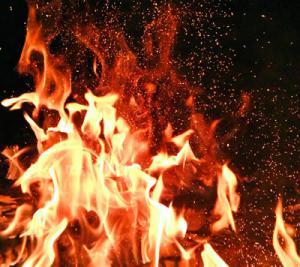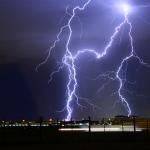 Fire is used many times by Jesus and other NT Writers as a metaphor of judgment. Photo: Pexels.com | Frank Cone
Fire is used many times by Jesus and other NT Writers as a metaphor of judgment. Photo: Pexels.com | Frank Cone
The Witness of the Apostolic Fathers
In Part 2 we looked at the evidence from the parables and sayings of Jesus pointing to some kind of final judgment. We also briefly looked at the evidence from the NT letters. Several texts from the epistles use the same language and tone found in the parables.
In this section I want to look at some of the texts contained in the group of writings known as the Apostolic Fathers. This is a set of early Christian writings that were seen as “inspired” in the late first century and the second century, yet failed to make it into the New Testament canon.
My purpose here is not to explain these texts. These texts illustrate that many of the earliest non-biblical Christian writings seem to echo the NT with respect to some kind of wrath and final judgment.
1 Clement [of Rome]
This passage comes within the context of writing about the judgment of Sodom and Lot’s wife. The text continues:
In Clement 28.1 the text speaks of the “fear of God” that can help us “forsake” wicked deeds which can “protect us from the judgments to come.” There is another such passage in Chapter 35.
2 Clement
In Chapter 6 the author cites a saying of Jesus, “No servant can serve two masters.” In this context he continues,
In Chapter 7 the author continues along the theme that to receive your “incorruptible” crown “you must run the straight course.” Those who do not press forward will face “the worm that shall not die, and the fire that shall not be quenched.” [Quoting Jesus in Mark 9:48 speaking of Hell]
In Chapter 8 the writer goes on to say that only in this world do we have the chance to repent and obtain eternal life. Chapter 16 has more language of judgment and fire that melts lead.
Ignatius of Antioch
Ignatius rarely uses terms like “eternal” or “forever” in his letters.[1] When he uses the concept of “eternal” it is almost always describing “life.”
HOWEVER, in Chapter 16 of his Letter to the Ephesians Ignatius writes,
Epistle of Barnabas
This entire document has a sharp tone, yet there is only one text that seems to speak of wrath and judgment. Like several documents in this literary group, Barnabas records the “Two Ways” teaching.
Didache
The Didache is a fairly positive document in my view. There is only one text that seems to speak of wrath and judgment. The text is in Chapter 16, the final chapter of the document.
The context seems to make the author’s point clear. This final chapter of the document speaks about the coming of Christ to end the age. The last two sentences speak of “the trumpet sound,” “the resurrection of the dead” and “the Lord coming upon the clouds of heaven.” Didache 16.14,17
According to the writer [in agreement with the gospel material] this is what will happen prior to the culmination of all things:
…in the last days false prophets and corrupters shall be multiplied, and the sheep shall be turned into wolves, and love shall be turned into hate…Didache 16.6,7
Then shall the creation of men come into the fire of trial, and many shall be made to stumble and shall perish; but those who endure in their faith shall be saved from under the curse itself. Didache 16.11-12
The thing to note is the contrast between those who “endure in their faith” and those who do not. “Sheep shall be turned into wolves” and apparently those who do not endure will not be saved and shall “perish.”
Epistle to Diognetus
In Chapter 10 the writer is bringing his presentation of the gospel to a close: “[God] promised the kingdom which is in heaven, and will give it to those that have loved Him…” Ep.Diognetus 10.2
When a person decides to become an imitator of God he will,
for those that shall be condemned to the eternal fire that shall punish those delivered over to it unto the end. Ep.Diognetus 10
Martyrdom of Polycarp

THE Fire of Judgment
The first thing I noticed reading texts specifically referring to judgment in the Apostolic Fathers collection was the references to “fire.” There are at least 12 NT texts that seem to clearly speak of the fire of final judgment. [2] We have five references in the Apostolic Fathers to some kind of final judgment and punishment with “fire,” 3-4 times being mentioned as “unquenchable.” [3]
Early Christian History Matters – Why?
There are many people who proclaim that we are not reading or understanding the biblical text properly with reference to many different topics. The question pushing this series of articles is:
“How Can a God of Love Also Have Wrath?”
I have read other patheos writers who proclaim with utter confidence that God is defined by “Love.” There is apparently no room for wrath and judgment. This view of divine punishment is easy to blame on uneducated “Hellfire and brimstone” preachers with a view of God that is not biblical.
We have just read several clear texts from Christian writings that date from 65-140 AD. These were documents that circulated long before the New Testament was officially assembled.
What these Early Christian Documents Tell Us
Reminder: the Apostolic Fathers were considered “inspired” writings in different regions of early Christianity.
- These documents are important because they give us a window into what the leaders of this time period thought about the earliest Christian traditions. There are allusions in each document to various sayings of Jesus recorded in the gospels. And each document has allusions to the apostolic letters.
- These early documents illustrate that in many ways the leaders in the second century read and/or heard AND understood the biblical texts in a fairly simple and literal way. Their views reflected the view of a final judgment and an accounting for all people.
THIS is why Early Christian History matters.
These extra-biblical documents give witness to the early traditions eventually recorded in the NT. The concept of a final judgment is clearly embraced in the second century. Finer questions about How? and How Long? are not fully addressed. In this category of judgment and punishment these writings are very similar to the early traditions, “the apostles’ teaching” that eventually appeared in the NT.
NOTES :
- Ramelli, Ilaria, A Larger Hope (Cascade Books 2019) lays out research for the use of aionios and aidios in the Greek texts to indicate “universal restoration.” Chapter 2 opens with Ignatius of Antioch, the subtitle begins “The Riddle of Ignatius,” pp.20ff where Ramelli believes Ignatius gives us a hint of “universal restoration” [This opening of Ch 2 is a bit sloppy. The first citation is of Ltr Smyr 2, followed by comments. Then, using quotation marks, she cites Ignatius again and the only citation is Ltr Smyr 1.1. The citation is actually from Ltr Eph 19.3.]. She does not comment on the passage cited above from Ltr Ephesians 16. The use of aionios and aidios in the Greek is not the only way to know what a writer thinks. Most of these ancient Christian writers speak of “eternal life” for the faithful while contrasting “the wicked.” Ignatius clearly states that the [wicked] “shall not inherit the kingdom of God” and “shall go away into unquenchable fire.” There is no use of aionios or aidios in this text, but the context of the passage is clear.
- Matthew (5); 2 Thessalonians (1); Hebrews (1); 2 Peter (1); Jude (2); Revelation (2). I only count Matthew’s gospel to avoid repetition; only once from 2 Peter 3 and Revelation 20.
- Total of 11 occurrences of “fire” that is speaking about judgment:
Didache (1); 2 Clement (6); Martyrdom Polycarp (2); Ep. Diognetus (2).












